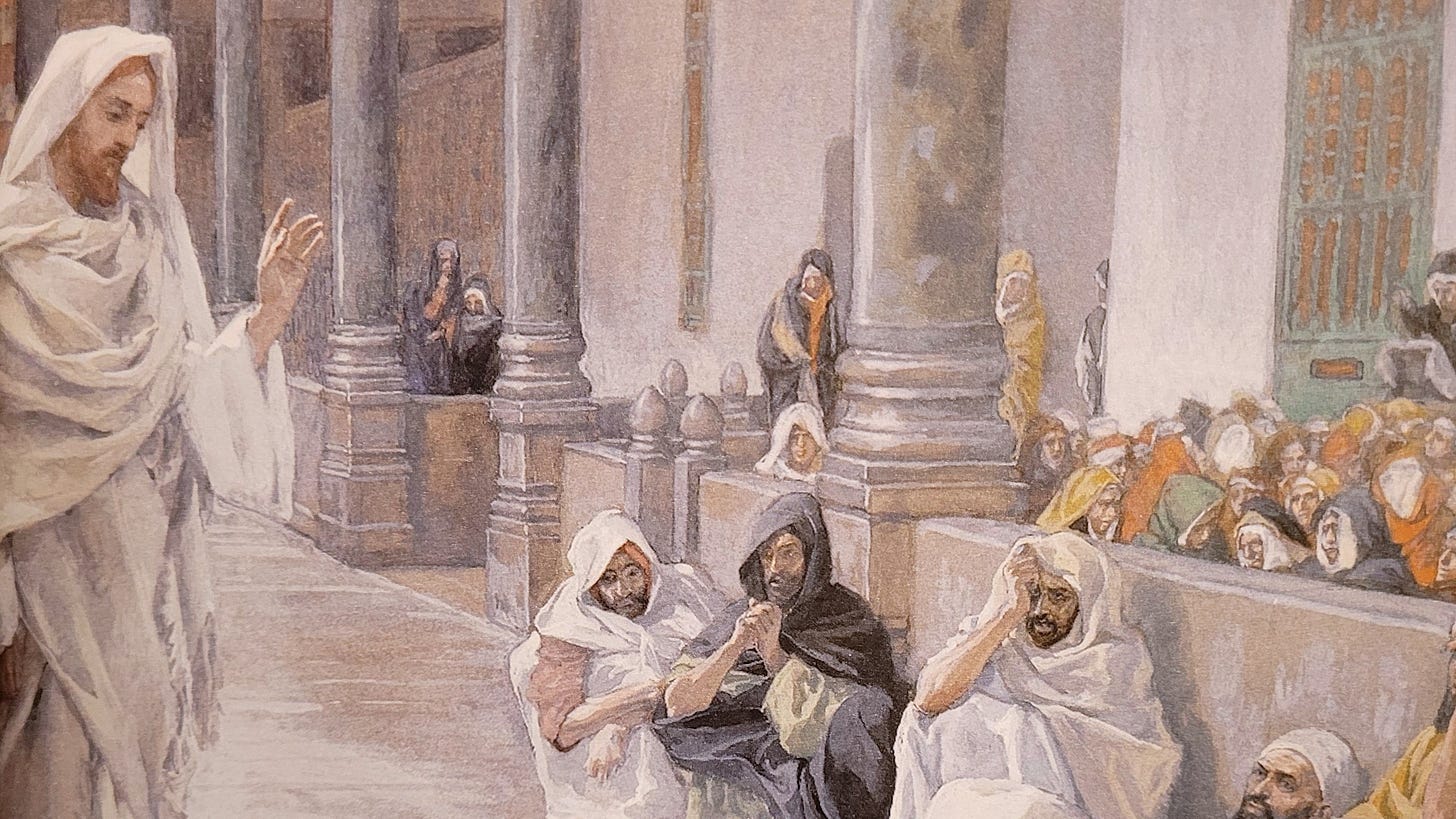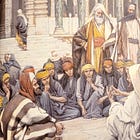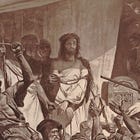Why does Christ say ‘You are of your father the devil’?
Can those who do the works of Satan still be called 'sons of Abraham'?

Can those who do the works of Satan still be called 'sons of Abraham'?
Editor’s Notes
NB: This is ‘Part V’ of a series on Christ’s disputes in the Temple. While the previous parts are rich reflections on these disputes, Parts V-VII are dealing directly with the Gospel for Passion Sunday and can be read without reference to Parts I-IV.
Our Lord made a threefold promise to his hearers during a series of disputes in the Temple: true discipleship, knowledge of the truth, and the freedom that only truth can give.
But when he offered them freedom, his hearers bristled with indignation, claiming they had never been in bondage. Christ responded by showing that sin makes slaves of all—and that freedom comes only through the Son.
In this Part, Fr. Coleridge tells us…
How Christ confronts the Jews’ boast of descent from Abraham by exposing their true father.
That true liberty comes not from lineage, but from the Son, who makes men sons of God.
Why Our Lord declares that their murderous unbelief proves their descent from the devil.
He shows us that mere fleshly descent from Abraham is nothing without sharing Abraham’s faith.
As these debates proceed, Christ’s is getting closer and closer to his definitive declaration:
“Before Abraham was made, I AM.”
This solemn affirmation of his divinity drives His enemies to fury—
and they take up stones to kill Him.
For more context on this episode, its significance and its place in the Roman Liturgy, see here:
Disputes in the Temple
The Preaching of the Cross, Part I, Chapter XIII
St. John viii. 12-20.
Story of the Gospels, § 93
Burns and Oates, London, 1886
Headings and some line breaks added.
Sung on Passion Sunday
How did the Sanhedrin know Christ would affirm his divinity under oath?
What prevented the Jews from hearing Christ’s words properly?
‘The seed of Abraham’
‘They answered Him, We are the seed of Abraham, and we have never been slaves to any man.’
The boast was not very true historically, for there had been the long period of slavery in Egypt, and during the Babylonian Captivity they had been in a state very nearly resembling that of bondsmen. Except during the period of the Asmonean monarchy, they had since been constantly dependent whether upon Egypt or Syria, and since that time they had been more or less openly under the dominion of the Romans. But it was the policy of their masters to leave them the semblance of self-government in many respects, and even to allow the Jews of the dispersion in the various cities of the Empire a large amount of practical independence.
In this sense it may have been a favourite boast among them that they had never been in bondage, and did not need emancipation.
‘How sayest thou, You shall be free?’
We gather from our Lord’s answer, that this interruption came from the bystanders rather than from those whom He was directly addressing. For He passed it by with a word, and then went on with the thought on which He was engaged, and which is the natural sequel to the promise, rather than the answer to the interruption.
‘Jesus answered them, Amen, amen I say to you, that whosoever committeth sin, is the servant of sin. Now the servant abideth not in the house for ever, but the Son abideth for ever. If therefore the Son shall make you free, you shall be free indeed.’
We must not be led astray by the change of word in our version, for in the Greek the same word is used when they say we have never been ‘slaves’ to any man, and when our Lord says that whosoever committeth sin is the ‘servant’ of sin, and that the ‘servant’ abideth not in the house for ever, but the ‘Son abideth for ever.’ The word is the natural and regular contrary to the word free, of which He had made use in the first instance.
Here then it seems that our Lord paused for a moment in His argument to notice the objection made to His words as far as it concerned their repudiation of any need of emancipation. Slaves to men they may not have been, but slaves to sin they must have been, in the sense in which He is speaking of slavery and emancipation. Here He leaves them, and goes on, as it seems, to continue the thought which He was presenting to the persons who were believing in Him.
He had spoken of their being made free by the truth. Now He pursues the same thought in His mind, but He makes a rapid and tacit transition which is not at first sight altogether easy to catch. He seems to have before Him the thought of the perfect liberty wherewith they were to be made free by the participation of His own Sonship, according to that which is said at the opening of this Gospel, ‘as many as received Him, to them He gave power to become the sons of God,’ true liberty being in essence identical with sonship. ‘Now the servant abideth not in the house for ever, but the Son abideth for ever.’
St Paul to the Galatians
The connection which is here assumed between the two ideas of liberty and sonship is supplied by St. Paul in the famous passage to the Galatians, which seems to be founded, not exactly on this discourse as related by St. John, but on the Apostle’s knowledge of the substance of this promise, and of the doctrine which underlies it. St. Paul argues that there is an immense difference between the servant and the son, and that ‘if he is a son, then also an heir through God.’
But it is the privilege of the heir to be in his father’s house as in his home, with a right to be there which is inalienable, and it seems that it is this privilege which our Lord here speaks of when He contrasts the position of the servant with that of the son. In the passage in the Epistle to the Galatians to which we refer, St. Paul founds a long argument on the allegory of the two sons of Abraham and their respective mothers, ending by the conclusion,
‘So then, brethren, we are the children not of the bondwoman, but of the free, by the freedom wherewith Christ has made us free.’1
This freedom is contained in the truth of our adoption as sons, which is conferred upon us by our Lord, Who imparts to us by grace the filial relation to God which is His own by nature. It seems to be this which is in the mind of our Lord when He says, that ‘the servant doth not abide in the house for ever, if therefore the Son shall make you free, you shall be free indeed.’ If this be so, we see how much ground there is for the interpretation of those who see in this passage a reference to the freeing of the Jews who believed from the yoke of the Mosaic Law, and it becomes more likely than it might seem at first sight that our Lord had this liberation in His mind when He spoke of the truth making them free, and of their being free indeed.
Moreover, this liberation is the result of the Passion, according to the doctrine of St. Paul in the same Epistle, where he says that our Lord ‘hath redeemed us from the curse of the Law,’ that is, the curse incurred by all who did not keep the Law, ‘being made a curse for us, for it is written, Cursed is every one that hangeth on a tree.’ Our Lord took on Himself this curse, and so annulled the curse which any violation of the Law involved.2
‘Your father the devil’
He then returns once more to the cavils of His enemies, who had objected that they were the seed of Abraham and had never been in bondage to any man. They were the children of Abraham according to the flesh, but their boast was just that of the futility of which St. John Baptist had warned them, when he had told them not to begin to say within themselves ‘we have Abraham to our Father,’ because God was able of the stones before them to raise up children to Abraham.
Our Lord insists on the same truth, and moreover adds the terrible truth, on which He speaks at some length, that they were practically the children, not of Abraham or of God, but of the devil.
‘I know that you are the children of Abraham, but you seek to kill Me because My word hath no place in you. I speak the things which I have seen with My Father, and you do the things that you have seen with your father.
They answered Him, Abraham is our father.
Jesus said to them, If you be the children of Abraham, do the works of Abraham. But now you seek to kill Me, a Man Who hath spoken the truth to you, which I have heard of God. This Abraham did not. You do the works of your father.
They say therefore to Him, We are not born of fornication, we have one Father, even God.
Jesus therefore said to them, If God were your Father, you would indeed love Me. For from God I proceeded and came, for I came not of Myself, but He sent Me. Why do you not know My speech? Because you cannot hear My word. You are of your father the devil, and the desires of your father you will do. He was a murderer from the beginning, and he stood not in the truth, because truth is not in him. When he speaketh a lie, he speaketh of his own, for he is a liar and the father of it. But if I say the truth, you believe Me not.
Which of you shall convince Me of sin? If I say the truth to you, why do you not believe Me? He that is of God heareth the words of God. Therefore you hear them not, because you are not of God.’
Sin against the light
The whole passage proves the severity with which our Lord was now, as it were, forced to speak and deal with these determined opponents of His, who were endeavouring to turn away from Him the souls who had been disposed to believe in Him in consequence of His preaching.
They were treated by Him as sinners against the light. They had had the evidences divinely appointed by God brought home to them, and they had chosen to disregard them, and to deal with Him as an impostor and blasphemer. They had defeated the good counsel of God towards themselves, as St. Luke puts it a little later.
But now He was no longer keeping Himself at a distance from them, as He had done for so long. His time was come for preaching in their very presence, and thus the danger to their souls of the mischief they might do to others was most terribly aggravated. He upbraided them therefore with great freedom. He did not hide His knowledge of their murderous designs, and He assigned these designs to their true origin, the father of lies and the murderer from the beginning. They sought to kill Him, because His word had no place in them.
To the evidences accumulated for them by the good Providence of God had succeeded the preaching and teaching which those evidences had been intended to authenticate, and now that they had made up their minds to reject the evidences, they could not but turn with savage hostility on the preaching and the Preacher. They had no alternative but to get rid of Him. He spoke to them that which He had seen with His Father, as He had said, and the Father had done His part in supporting the mission of His Son.
Their part was to acknowledge Him as the Messenger of God, and by that acknowledgment not only to place themselves within the pale of salvation, but to help on the great work of God by witnessing to the whole world that it had been authenticated in the most complete way. If His words seem unusually severe, this is the account to be given of their severity. It is not the severity of a man goaded to anger and resentment, for we see all through how calm and even tender He was in the rebukes He was administering. It is the severity of one who sees the immensity and the imminence of the danger to which they were exposing themselves, and so, out of love for their souls, does not spare them the truth.
Moreover, the authority of our Lord had already been sufficiently proved to them, and so He could not but speak to them with the dignity and majesty of His Divine Person.
‘We are not born of fornication’
‘They said therefore to Him, We are not born of fornication, we have one Father, even God.’
They seem to have misunderstood His words about their father, whom He had not yet named. The Scriptural use of the word ‘fornication’ suggests the idea of idolatry, and if we follow that sense, the Jews must be understood as priding themselves upon their worship of and belief in the One true God, which was the blessing and characteristic of Abraham. Not that the whole race of mankind was as yet lost in idolatry and polytheism in his time, but he had been chosen by God as the father of the one people among whom the true faith and worship were to be kept up. But our Lord had told them that the proof that God was not their Father was contained in their treatment of and behaviour towards Himself, Who proceeded and came from God, having been moreover sent by Him.
Why they could not understand
‘Why do you not know My speech? Because you cannot hear My word.’
God had promised, of the Prophet Whom He was to send like Moses:
‘I will put My words in His mouth, and He shall speak to them all that I shall command Him, and he that will not hear His words which He shall speak in My Name, I will be the revenger.’3
Our Lord seems to allude to this promise more than once in the course of this series of disputes, and to say that, so far from being able to take in and consider the subject on which He speaks to them and the arguments which it involves, they do not even yet understand the language in which He conveys it.
Thus, for instance, when He had spoken about freedom, about the truth making them free, and the Son making them free, they had not been able to conceive the ideas which the words conveyed, and so had misunderstood the words, thinking that they referred to national freedom and independence.
End of Part V. Our Lord has exposed the false boast of Abrahamic descent, and laid bare their true spiritual paternity.
In the next part, Father Coleridge will explain why it is that Our Lord called the Devil a “murderer” and the “father of lies”—and why those who reject him embrace this lineage.
Disputes in the Temple
How did the Sanhedrin know Christ would affirm his divinity under oath?
What prevented the Jews from hearing Christ’s words properly?
Read Next:
Here’s why you should subscribe to The Father Coleridge Reader and share with others:
Fr Coleridge provides solid explanations of the entirety of the Gospel
His work is full of doctrine and piety, and is highly credible
He gives a clear trajectory of the life of Christ, its drama and all its stages—increasing our appreciation and admiration for the God-Man.
If more Catholics knew about works like Coleridge’s, then other works based on sentimentality and dubious private revelations would be much less attractive.
But sourcing and curating the texts, cleaning up scans, and editing them for online reading is a labour of love, and takes a lot of time.
Will you lend us a hand and hit subscribe?
Follow our projects on Twitter, YouTube and Telegram:
Gal. iv.
Gal. iii. 13.
Deut. xviii. 19.





